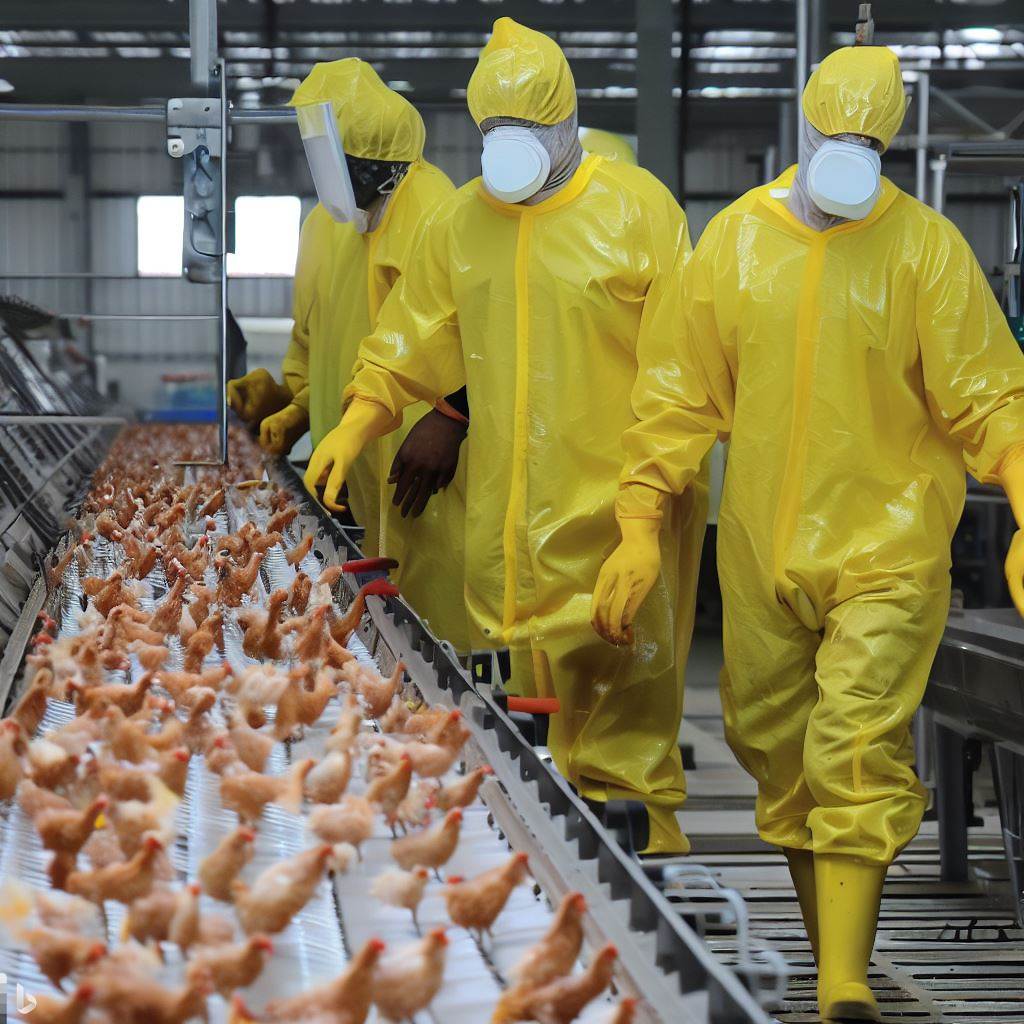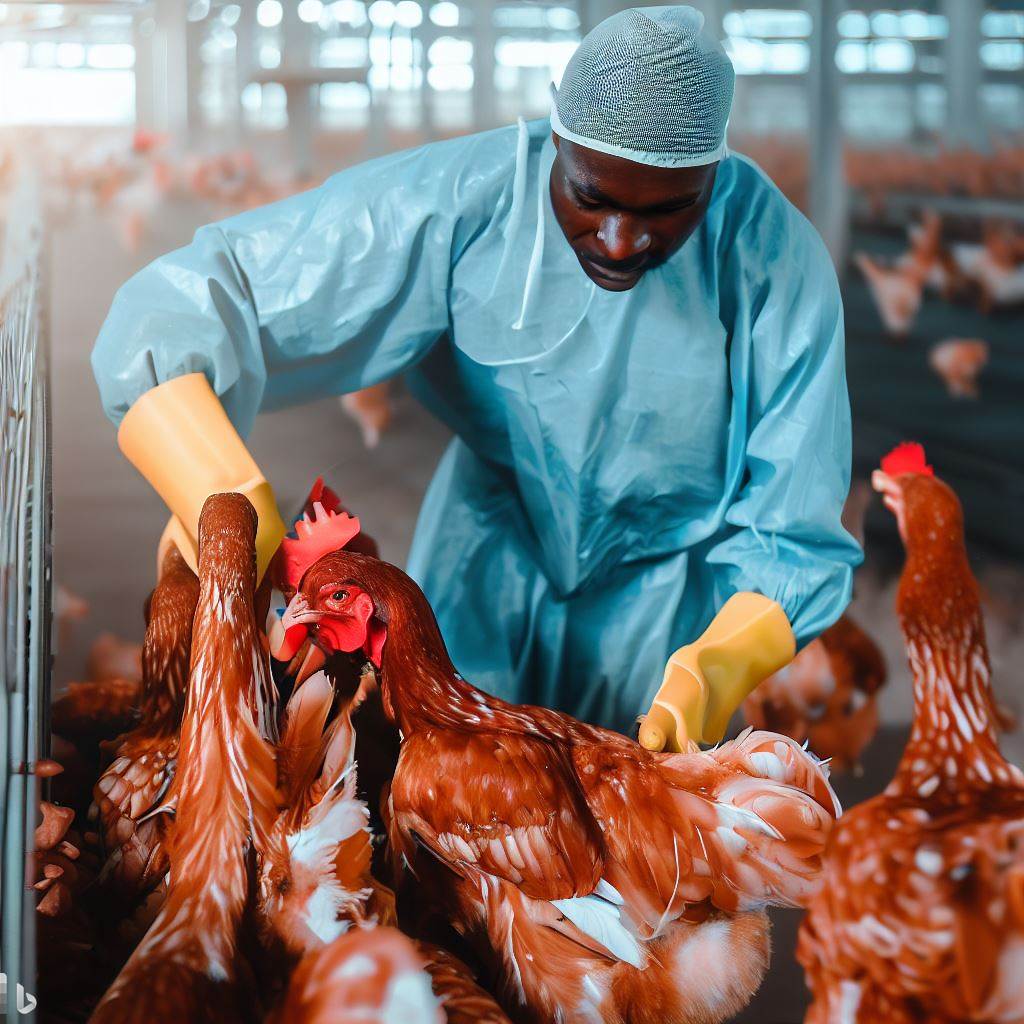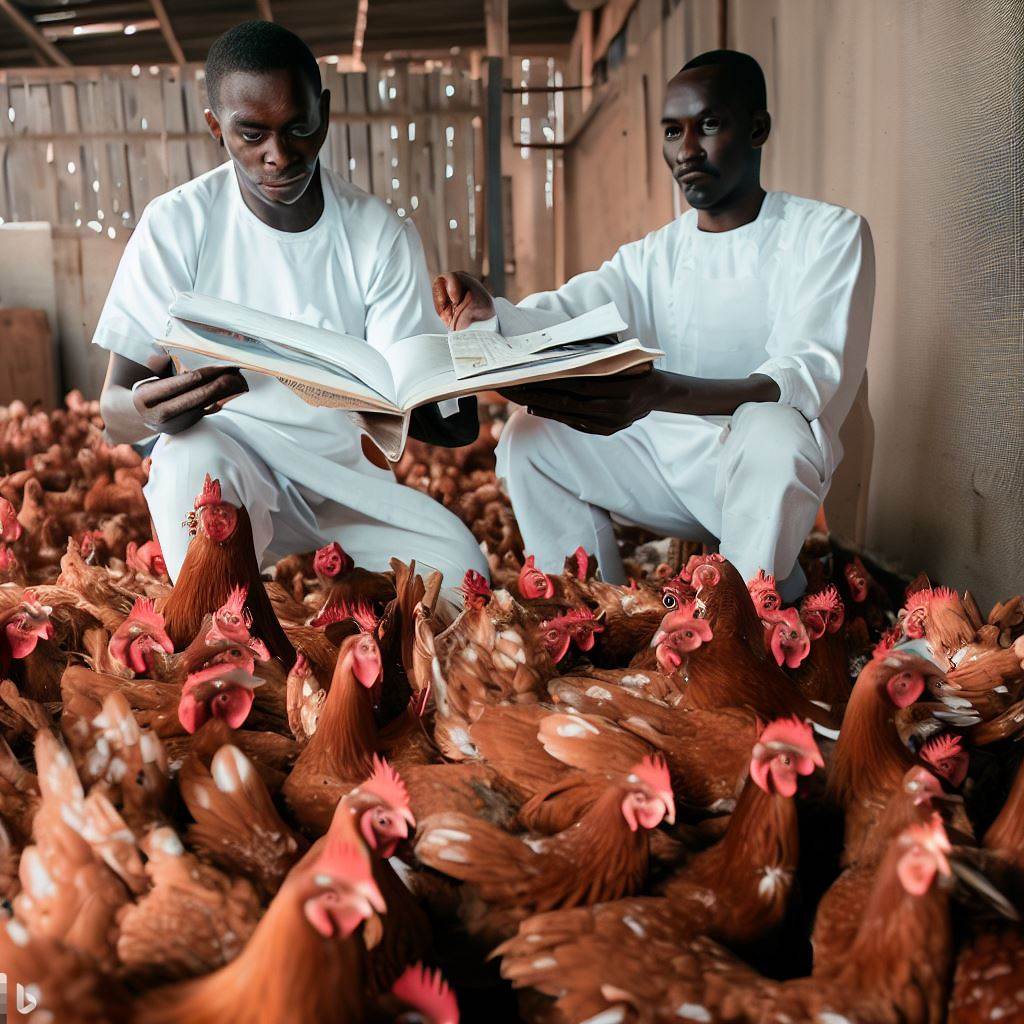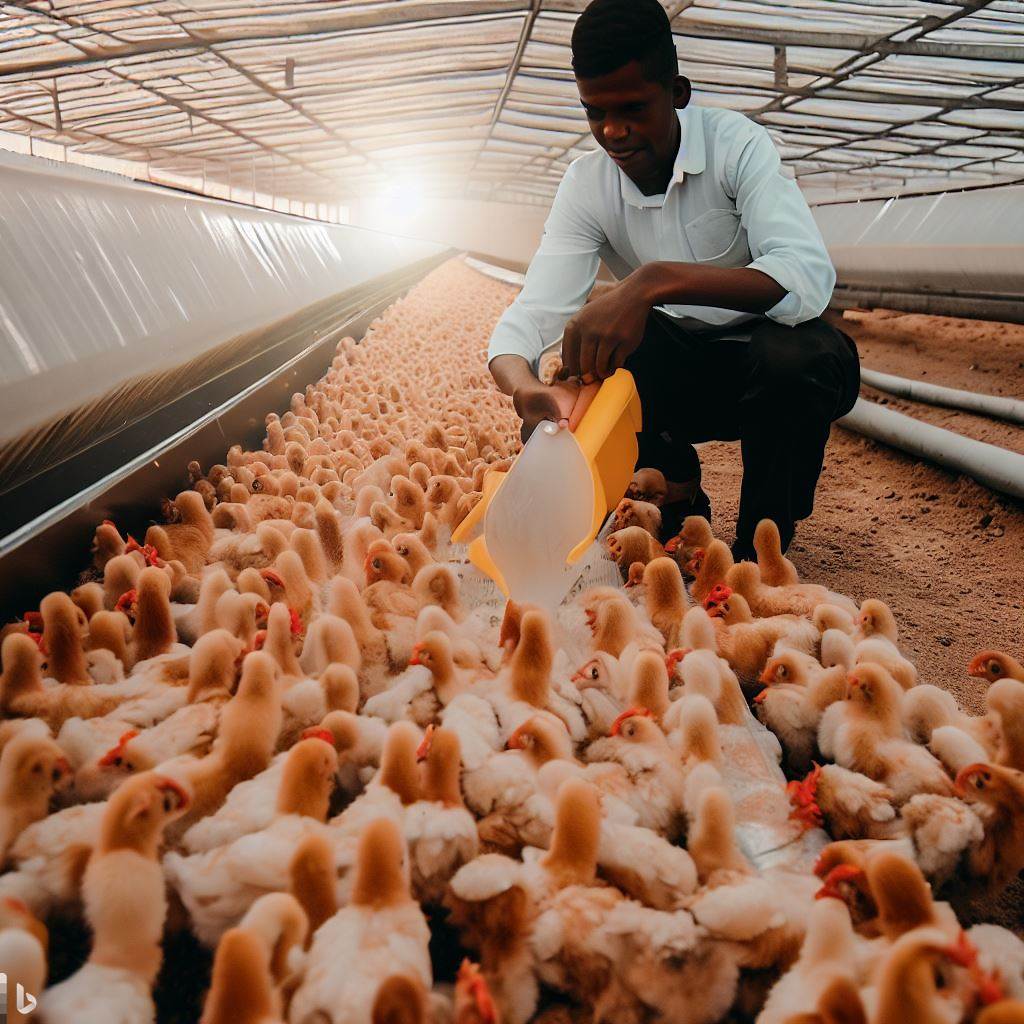Introduction
The poultry industry holds a pivotal role in Nigeria’s agricultural sector, not only in terms of employment generation but also in meeting the escalating food requirements of the population.
The vitality of upholding stringent health and safety standards within Nigeria’s poultry sector cannot be overstated.
These standards are indispensable not only for the well-being of both humans and animals but also for maintaining the overall integrity of the industry.
A sound adherence to health and safety protocols guarantees the protection of human health by minimizing potential disease transmission from poultry to consumers.
Furthermore, it aids in the humane treatment of animals, addressing concerns about animal welfare.
All in all, as Nigeria’s poultry industry remains a linchpin in its agricultural landscape, the implementation of robust health and safety standards is non-negotiable.
Not only do these standards mitigate health risks associated with poultry consumption, but they also underscore the nation’s commitment to sustainable and ethical agricultural practices.
Current State of Health and Safety Standards in Nigeria’s Poultry Industry
A. Lack of adequate regulations and enforcement
- Poultry industry in Nigeria lacks proper regulations and enforcement of health and safety standards.
- This lack of regulatory framework leads to a higher risk of health hazards for both workers and consumers.
- Without clear guidelines and enforcement, poultry farmers may ignore safety practices to cut costs and maximize profits.
- The absence of regulations also hinders the growth and development of the industry.
B. Common health and safety issues in poultry farms
- Poor waste management practices
- Inadequate biosecurity measures
- Improper handling and storage of chemicals
In short, the current state of health and safety standards in Nigeria’s poultry industry is inadequate.
The lack of regulations and enforcement allows for poor waste management practices, inadequate biosecurity measures, and improper handling and storage of chemicals.
These issues not only compromise the health and safety of workers but also pose risks to consumers and hinder the industry’s growth.
It is crucial for the government and relevant authorities to address these shortcomings through the implementation of strict regulations, proper enforcement, and awareness campaigns to promote a safe and sustainable poultry industry in Nigeria.
Implications of Poor Health and Safety Standards
A. Health risks for consumers
- Inadequate health and safety standards in Nigeria’s poultry industry can lead to the presence of harmful pathogens in poultry products.
- Consumers may suffer from foodborne illnesses caused by bacterial contamination, such as salmonella and E. coli.
- Poorly handled or unhygienic conditions can result in the transmission of diseases from animals to humans.
- Lack of proper controls and inspections can result in the consumption of poultry products with high levels of chemical residues.
- Consumers may experience adverse health effects, including nausea, vomiting, diarrhea, and even life-threatening complications.
B. Economic impact on the industry
- Low health and safety standards negatively impact the reputation of Nigeria’s poultry industry.
- Consumer confidence in locally produced poultry products tends to decline, leading to reduced demand.
- Export opportunities may be limited or even lost due to concerns over product safety and quality.
- Increased cases of foodborne illnesses can result in higher healthcare costs for both individuals and the government.
- The poultry industry may face financial losses due to product recalls, legal actions, and damage to its brand image.
C. Challenges faced by poultry farmers due to non-compliance
- Poultry farmers who fail to comply with health and safety standards are at risk of closure or heavy fines.
- Non-compliant farmers may lose access to market opportunities and face difficulties in securing loans or investments.
- The lack of compliance can lead to increased mortality rates among poultry, resulting in reduced productivity and profitability for farmers.
- Farmers might struggle with disease outbreaks, causing significant losses in their poultry stock and jeopardizing their livelihood.
- Non-compliance hinders farmers’ ability to adopt new technologies and best practices, thereby impeding industry growth and competitiveness.
Ensuring robust health and safety standards in Nigeria’s poultry industry is crucial for safeguarding public health, maintaining consumer trust, and driving economic growth.
Policymakers, regulators, and industry stakeholders must collaborate to establish and enforce stringent regulations, improve monitoring systems, and provide support mechanisms that encourage compliance.
By investing in training programs, promoting good agricultural practices, and raising awareness among poultry farmers and consumers, Nigeria can achieve a sustainable and thriving poultry industry that prioritizes health and safety at every step of the value chain.
Efforts Towards Improving Health and Safety Standards
Improving health and safety standards in Nigeria’s poultry industry is a critical task that requires a multi-faceted approach.
The government and non-governmental organizations (NGOs) have been making efforts to address this issue, recognizing the importance of ensuring the well-being of both poultry workers and consumers.
A. Nigerian government initiatives
The Nigerian government has implemented various initiatives to improve health and safety standards in the poultry industry.
One of the key steps taken is the introduction of laws and regulations specifically aimed at addressing health and safety concerns.
These laws serve as a framework for poultry operations, ensuring that necessary guidelines and standards are followed.
In addition to legislation, the Nigerian government has also focused on strengthening regulatory bodies responsible for monitoring and enforcing health and safety standards.
These bodies are tasked with conducting regular inspections, ensuring compliance, and addressing any violations or non-compliance with established standards.
B. Non-governmental organizations (NGOs) working towards improvement
Non-governmental organizations (NGOs) play an essential role in complementing government efforts to improve health and safety standards in the poultry industry.
These organizations work towards creating awareness among poultry farmers and workers about health and safety practices through targeted campaigns and training programs.
NGOs also emphasize collaboration with farmers and other stakeholders in the poultry industry.
By actively involving farmers in initiatives and decision-making processes, NGOs ensure that their perspectives and experiences are taken into account.
This collaborative approach aims to develop sustainable solutions and practices that are both effective and practical.
By working hand in hand with the government and other stakeholders, NGOs can make a significant impact on the overall health and safety standards in Nigeria’s poultry industry.
They provide crucial support in terms of education, training, and advocacy, ultimately resulting in a safer and healthier environment for everyone involved.
In essence, the improvement of health and safety standards in Nigeria’s poultry industry necessitates the collective efforts of the government, non-governmental organizations (NGOs), and other stakeholders.
Initiatives such as the introduction of laws and regulations, strengthening of regulatory bodies, awareness campaigns, and collaboration with farmers are crucial steps towards achieving this goal.
Through these combined efforts, the poultry industry in Nigeria can ensure the well-being of its workers and consumers while maintaining high standards of health and safety.
Read: Sustainable Practices for Poultry Producers in Nigeria

Best Practices for Ensuring Health and Safety in the Poultry Industry
When it comes to the health and safety standards in Nigeria’s poultry industry, following best practices is essential to prevent outbreaks and ensure the well-being of both poultry and workers.
Here are some key practices that should be implemented:
A. Implementing proper waste management practices
- Regularly clean and disinfect poultry houses, equipment, and surrounding areas to control disease spread.
- Separate different types of waste, such as feathers, manure, and dead birds, for appropriate disposal.
- Comply with environmental regulations and guidelines for waste disposal to avoid contamination.
- Train workers on proper waste management techniques and provide them with necessary protective equipment.
- Monitor waste management practices regularly to ensure compliance and effectiveness.
B. Enhancing biosecurity measures
- Implement strict access control measures to prevent unauthorized personnel from entering poultry facilities.
- Establish footbaths and handwashing stations at entrances to reduce the risk of disease transmission.
- Use disinfectant foot mats to clean footwear before entering and leaving poultry areas.
- Regularly inspect and maintain fencing, gates, and other physical barriers to prevent any breaches.
- Ensure that all visitors and vehicles follow proper biosecurity protocols before entering the premises.
C. Ensuring safe handling and storage of chemicals
- Provide appropriate training to workers on the safe handling and storage of chemicals used in the poultry industry.
- Store chemicals in designated areas with proper ventilation and temperature control.
- Clearly label all chemicals and ensure they are stored in their original containers.
- Secure chemicals to prevent accidental spills or unauthorized access.
- Regularly inspect chemical storage areas for any signs of leaks or damage.
D. Promoting good animal husbandry practices
- Ensure proper nutrition and balanced diets for poultry to promote their overall health.
- Provide clean and adequate water supply to prevent dehydration and maintain bird health.
- Maintain optimal temperature and ventilation inside poultry houses to minimize stress and disease risks.
- Regularly monitor flock health and promptly address any signs of illness or abnormal behavior.
- Implement vaccination programs and follow recommended protocols to prevent the spread of diseases.
By implementing these best practices, the Nigerian poultry industry can maintain high health and safety standards, safeguarding both poultry and those involved in the industry.
Read: A Day in the Life of a Nigerian Poultry Farmer
Success Stories and Case Studies
Examples of poultry farms implementing effective health and safety standards
- Afrovest Hatcheries in Lagos has achieved remarkable success by implementing stringent health and safety standards.
- Hi-Tech Feeds and Hatcheries in Abuja has set a benchmark for other farms by adopting best practices in health and safety.
Positive outcomes and benefits experienced by compliant farms
- Increased productivity: Farms that prioritize health and safety standards have reported higher productivity levels.
- Improved animal welfare: Compliant farms ensure better living conditions and care for their poultry.
- Enhanced reputation: Farms that adhere to health and safety standards build a positive reputation in the industry.
- Healthier poultry: Farms with effective standards experience fewer disease outbreaks, resulting in healthier poultry.
- Lower mortality rates: Compliant farms have lower mortality rates due to improved biosecurity measures.
- Reduced costs: Implementing health and safety standards helps farms minimize losses due to diseases and accidents.
- Sustainable operations: Compliant farms focus on sustainable practices, benefiting both the environment and the industry.
- Compliance with international standards: Farms with effective health and safety standards can meet global market requirements.
In the end, implementing effective health and safety standards in Nigeria’s poultry industry brings tremendous benefits to farms.
Successful case studies like Afrovest Hatcheries and Hi-Tech Feeds and Hatcheries demonstrate the positive outcomes achieved by compliant farms.
Higher productivity, improved animal welfare, enhanced reputation, and cost reduction are among the advantages experienced.
Compliance not only ensures healthier poultry and lower mortality rates but also promotes sustainability and facilitates access to international markets.
It is crucial for all poultry farms in Nigeria to prioritize and adhere to robust health and safety standards for the overall growth and success of the industry.
Read: Insider Tips for Profitable Poultry Farming in Nigeria
Remaining Challenges and Future Prospects
- Enforcement and compliance issues.
- Need for continuous monitoring and evaluation.
- Potential for industry growth and international competitiveness.
A. Enforcement and compliance issues
The effectiveness of health and safety standards in the Nigerian poultry industry depends on their enforcement and the compliance of industry stakeholders.
However, several challenges hinder the achievement of this goal.
- Lack of adequate regulatory bodies and personnel.
- Inadequate penalties and sanctions for non-compliant entities.
- Corruption and bribery.
- Limited awareness and knowledge.
B. Need for continuous monitoring and evaluation
To address the challenges in enforcing health and safety standards, it is imperative to establish a system of continuous monitoring and evaluation.
- Regular inspections and audits.
- Implementation of digital tools and data-driven processes.
- Collaboration between regulatory bodies and industry stakeholders.
- Providing training and awareness programs.
C. Potential for industry growth and international competitiveness
Despite the existing challenges, Nigeria’s poultry industry has substantial potential for growth and international competitiveness.
- Large domestic market.
- Investment in modern technologies and infrastructure.
- Promoting export opportunities.
- Research and development.
In fact, while enforcement and compliance issues pose significant challenges, the Nigerian poultry industry has the potential for growth and international competitiveness.
To overcome these challenges, it is essential to address enforcement and compliance issues, establish a system of continuous monitoring and evaluation, and invest in modern technologies and infrastructure.
By doing so, Nigeria can ensure the health and safety standards in its poultry industry, leading to a prosperous and globally competitive sector.
Read: Understanding the Market Demand for Poultry in Nigeria
Conclusion
Ensuring health and safety standards in Nigeria’s poultry industry is crucial for various reasons.
Firstly, it protects the health and well-being of workers and consumers.
By implementing proper hygiene practices, regular inspections, and adequate training, potential health risks can be minimized.
Additionally, maintaining high standards can enhance the reputation and competitiveness of Nigeria’s poultry industry both domestically and internationally.
However, it is evident that there are significant challenges and shortcomings in achieving optimal health and safety standards in the industry.
The lack of stringent regulations, inadequate enforcement, and limited awareness among stakeholders contribute to the prevailing issues.
Therefore, a collective effort is required to address these issues.
Stakeholders, including government agencies, industry associations, poultry producers, and consumers, must prioritize and support improvements in health and safety standards.
Government agencies need to enact and enforce robust regulations to ensure compliance.
Industry associations should establish guidelines and provide training programs to educate poultry producers on the importance of health and safety standards.
Poultry producers should take responsibility for implementing sound practices and investing in necessary infrastructure and equipment.
Lastly, consumers should demand poultry products that meet stringent health and safety standards, creating a market-driven incentive for improvement.
By collaborating and taking proactive measures, stakeholders can make significant strides in improving health and safety standards in Nigeria’s poultry industry.
This will lead to a safer working environment, healthier products, and increased consumer trust.
It is essential to prioritize this issue to safeguard the interests of workers, protect public health, and promote the sustainable growth of Nigeria’s poultry industry.




